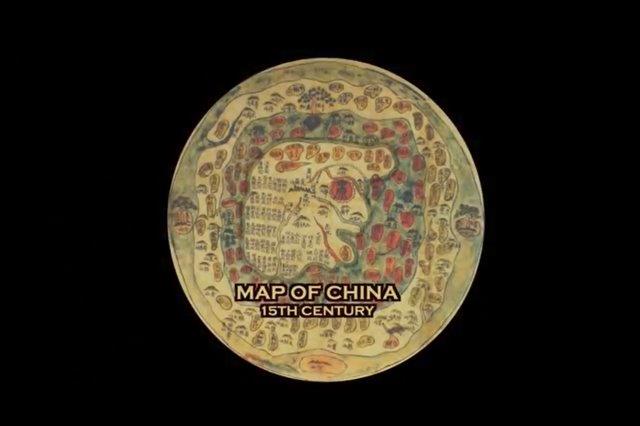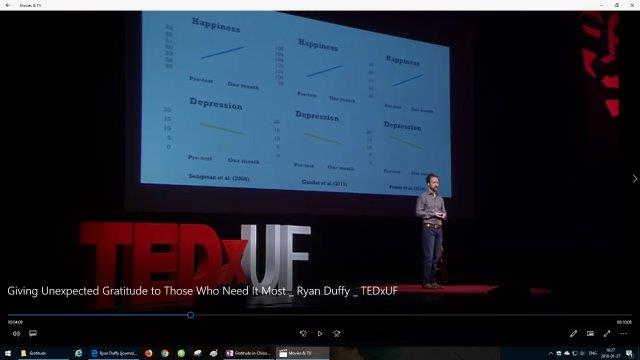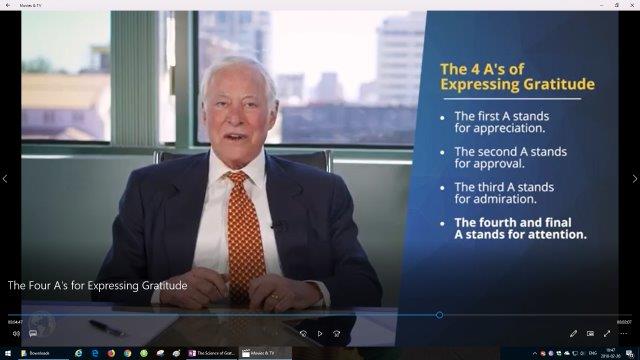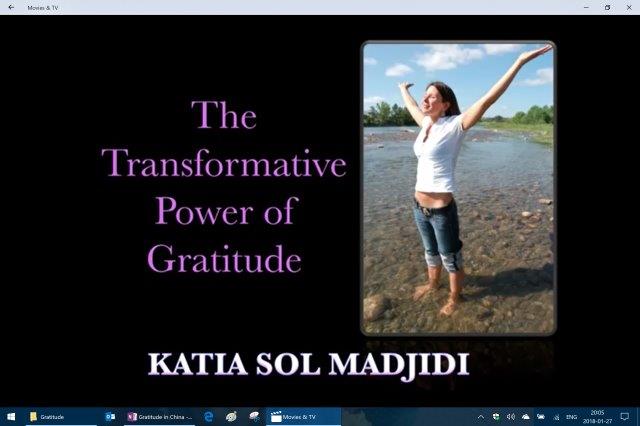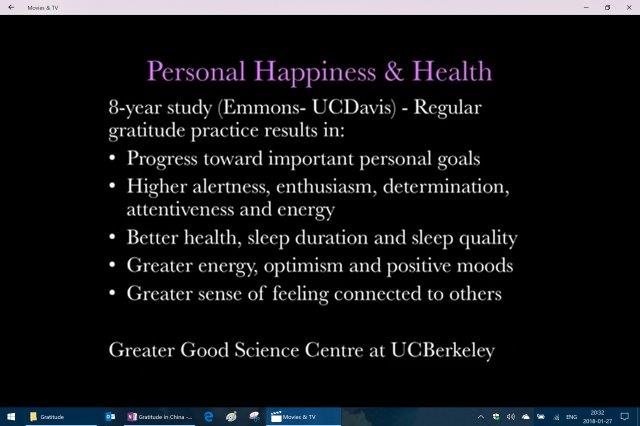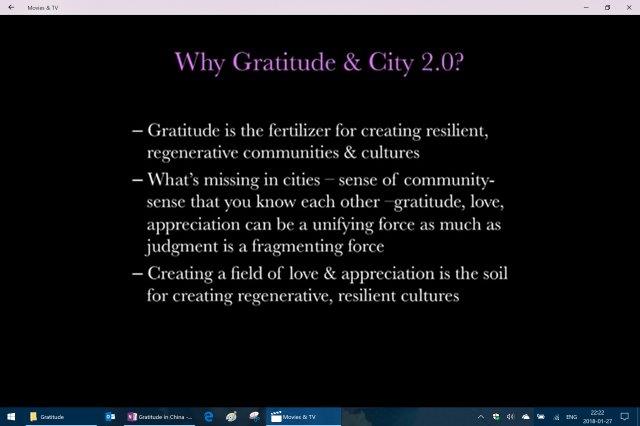Science of Gratitude
Gratitude is very intuitive, everybody knows that being grateful is a good thing. We have all experienced it and expressed gratefulness to other people throughout our lives. When life is good and everything is flowing well we tend to have a higher level of appreciation but when life is tough and nothing seems to be working out we struggle to be grateful, and why would we, after all if life sucks what the hell is there to be grateful for?
The first reason is learning and applying gratefulness will help you get through tough times while maintaining decent human character. It will minimize or eliminate complaining helping you to keep from being a bitch or an asshole. Secondly but not last there is good scientific support that gratitude is linked to happiness and greater life satisfaction. When we learn the benefits of being grateful and understand some of the science behind the attitude we learn that it is not something that you are normally aware of. Like happiness it requires cognitive effort to answer questions about if you are grateful. You have to think about it and evaluate past events to really consider in an overall picture if you are generally happy, sad, angry, or expressing gratitude in your life.
For me this subject got serious attention while living in China. After the honeymoon of being in this mysterious land wore off the reality of working and living in a developing nation kicked in and everything became a challenge. Fully committed to making life in China work out I did the personal development work to change my gratitude attitude.
China is an ancient civilization with a unique culture that is mysterious to most of the west. The Chinese word for “China” is Zhong Guo meaning “middle kingdom” but throughout history it had a very different meaning. As the below 15th century map shows there was a time China believed they were the center of the universe, and there has been many times in history they were, at least they have been a world super power with advanced technology far beyond the west but somehow managed to lose its position.
This century may be a time for China to rise up once again so understanding this culture will be critical for successful relations and a prosperous life for the westerners choosing China as their home. Many of us that have been here long enough realize the challenges of adapting to this culture. Me being here 15 years, running a small company and married into the culture began to understand the challenge of living in a developing country.
In China remaining positive or grateful becomes seriously challenged when you’re trying to get something done, especially if you have a series project that requires skill and professionalism. It is one thing to visit China on a holiday, but when your employer is demanding productivity or your business requires problems solved you will inevitably face issues and incompetency’s that will challenge the very notion of common sense, efficiency or effectiveness testing your character to the limits.
A few of my pet peeves have been:
- The inconsideration of queuing in a line or driving in the streets is utterly a rude and an annoying experience.
- The shoddy workmanship, serious lack of maintenance or preparation.
- The way garbage is handled or not handled.
- The lack of caring for and respecting for the environment.
- Inadequate heating system in homes and offices, plumbing constantly pumping sewer gases in your home and office.
- The trickery, hidden agendas and corruption in business.
- Living with constant noise, air and light pollution.
China has been a real challenge to have a positive mental attitude and express gratitude. It is not just China but where ever you might live there will be times and situations the test the best of us and it is precisely those times when we need to be more aware of our attitudes towards other people, governments and societies in as a whole. I would like to quote Steindl-Rast from his TED Talk [David Steindl-Rast: Want to be happy? Be grateful] with one of his main points being “It is not being happy that makes you grateful but being grateful that makes you happy.” I am not sure I agree with him on this point especially after reflecting on my experience and writing the article on [Applications from the Science of Happiness] but I will concede that gratitude is a definitely a component of happiness.
What he did say that is directly related to this article is that life does have its challenges and that within every challenge comes opportunity. Steindl-Rast describes learning how to be grateful for the opportunities that lie in the difficulties we face. Life presents many challenges and things we won’t be grateful for but in lies the opportunity to be grateful to overcome adversity, and the opportunity to rise to the challenge and develop your character.
Let’s start with a basic definition of gratitude and then look at some of the science around it. Wikipedia defines it as; Gratitude, thankfulness, thanksgiving, or gratefulness, from the Latin gratus ‘pleasing, thankful’, is a feeling of appreciation felt by and/or similar positive response shown by the recipient of kindness, gifts, help, favors, or other types of generosity, towards the giver of such gifts. The experience of gratitude has historically been a focus of several world religions. It has also been a topic of interest to ancient, medieval and modern philosophers, and continues to engage contemporary western philosophers. The systematic study of gratitude within psychology only began around the year 2000, possibly because psychology traditionally focused more on understanding distress than on understanding positive emotions. The study of gratitude within psychology has focused on the understanding of the short term experience of the emotion of gratitude (state gratitude), individual differences in how frequently people feel gratitude (trait gratitude), and the relationship between these two aspects. From https://en.wikipedia.org/wiki/Gratitude
The Science of Gratitude
According to Robert Emmons “Gratitude” itself was not seriously studied until about 2003 when the amount of scientific and research papers started to increase with a continuous upward trend through to today.
[Robert Emmons Gratitude as the Lynchpin Between Adversity and Delight]
Emmons is a Professor of Psychology at UC Davis California. His research is in the field of personality psychology, emotion psychology, and positive psychology.
Here Emmons quotes Ben Stein, a financial guru when investors asked “How to invest money wisely and get rich quick?”.
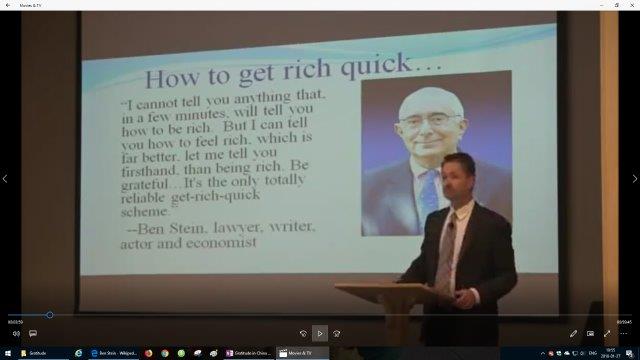
4 Categories of benefits people get from keeping a 5-minute/day “gratitude journal” in the randomized study they did. In (brackets) is the positive emotions and feelings that people reported in each category.
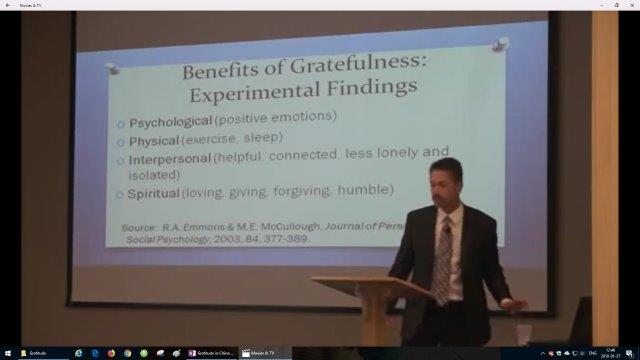
In the above study is the participants that kept a gratitude journal consistently experienced more positive emotions, exercised more often and slept better, felt more connected to others and not as lonely. The study also found a strong correlation to being more humble, forgiving and more pleasant to be around.
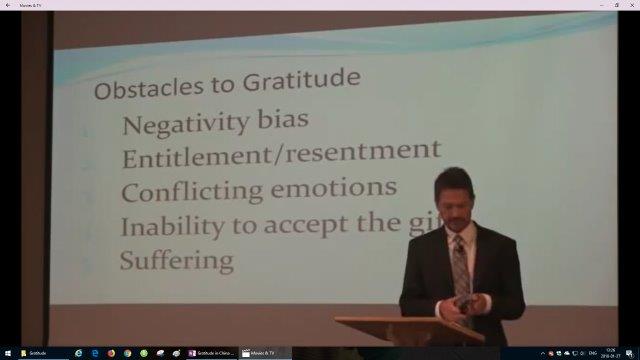
Another one for this list he mentioned but is not on this list is “complaining”. There are legitimate complaints and an appropriate time to “register a complaint” but coming back home from a rough day at work to bitch and complain will be a negative influence on your health and relationships. The amount of complaining, bitching and anger is a good measure of your mental state and ultimately your overall life satisfaction.
[Giving Unexpected Gratitude to Those Who Need It Most _ Ryan Duffy _ TEDxUF]
Duffy cites studies with the application of writing a gratitude letter to people that have helped them and the follow up results claiming that people are happier and less depressed.
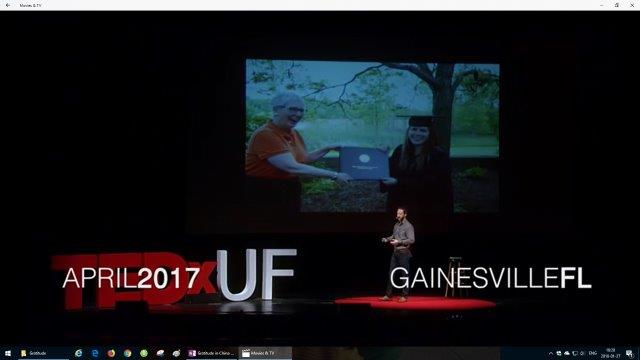
Duffy brings up a good exercise of turning the act of giving gratitude from those who of helped us to those at a low point in life and showing gratitude to them tying it into his opening story of how his mother helped her disabled sister to get through school. An excellent example of what we can learn about people, ourselves and developing empathy.
[The Four A’s for Expressing Gratitude]
Brian Tracy is a success guru and been sharing strategies and ideas on sales, business, and how to have a better life for 40 plus years. Still going strong at 74 years old Brian shares his 4 “A’s” on gratitude, a simple 4 points that applied regularly will help adjust your attitude for a more fulfilling life.
[The transformative power of gratitude Katia Sol at TEDxMission The City2.0]
Madjidi is involved with the Regenerative Design Institute at Bolinas California a system of agriculture and social design principles centered around simulating or directly utilizing the patterns and features observed in natural ecosystems. From <https://en.wikipedia.org/wiki/Permaculture>
Madjidi’s focus is on our inner garden, the practice of gratitude which she shares some of her personal applications she posted online and the connection between the Permaculture work of the institute. In this talk she cites some of Robert Emmons work with the following:
The Power of Gratitude:
- Gratitude has been directly correlated with physical health. Not just the sociological and or mental disorders like depression but actual physiological health and well-being. (This means you will sleep better, have more clarity of mind, to less aches and pains from aging or bad habits and overall higher energy levels.)
- Claims that brain function becomes more harmonized and balanced, the heart pumps more rhythmic and biochemical changes trigger a host of beneficial responses.
- Reduces negative feelings and emotions especially related to past negative memories.
- Grateful people have a positive memory bias. (A tendency to remember all the positive things in life compared to depressed people who remember all the negative things.)
- It helps you overcome adversity, suffering, loss and difficulties of life.
- Grateful people experience higher levels of enthusiasm, determination and energy to pursue your personal goals.
- Grateful people experience more optimism and more positive moods.
- Grateful people feel more connected to people and less lonely.
I would like to comment on the “connection to people” as this was also key to happiness and overall life satisfaction. In our study of [The Applications from the Science of Happiness] we found the happier you are the better your relationships with people and visa/versa but more profound is that happiness was more connected to the quality rather than the quantity so deepen those close relationships and apply the science of gratitude.
Pre-Application Exercise:
Another valuable exercise before you start applying some applications is to record your current state and attitude over a one to three month time period. This will help you better know the reality of your true state and when applied if the applications are really giving you the benefits you want. You can simply make a note every time you get upset, bitch, complain or get angry at someone or something. If you prefer a little more detailed account create a spreadsheet that lists moods/feelings across the Y-Axis, one month down the X-Axis and make a check every time you express one of those negative feelings. I did a spreadsheet and used a number indicating the amount of emotion from that list of states.
It might really surprise you when you see the reality of what you’re like, you may be pleased with the results or you might get a wakeup call and recognize that you really need to change. Below are some tips and applications you can consider to increase your level of gratitude.
Applications for Gratitude:
- Make a list of people you are grateful for and call, write or express “thanks” for what they did to help you.
- Create a list of all the things you are grateful for. Make it a dynamic document and continue to add to it throughout the days, weeks, months.
- The above two points can be your “gratitude journal”, make lists, journal experiences and or people you are grateful for and include actions you can take, do it and record the results.
- Adjust your vocabulary to include the words “I appreciate that” and “Thank you”, “I am very grateful for that” over and over again. Use the language as much as possible in your daily life, with your friends, your family, your co-workers and those you meet.
- Make a regular routine with your family or friends and ask “What are you grateful for today?”, this helps develop the grateful intentionality and use of the language.
- Write a gratitude letter to someone that has helped you in life. Someone who has helped you a great deal but you have never really given them the deserved thanks. Take some time to think of all the ways they have helped you and write it all down.
- Decide to make this part of who you are, engage in the process of constantly expressing thanks and gratitude, keep a file of people and things your grateful for, especially your children, your family and friends and experience the positive change this will have in your life.
Thanks, to all of you that participated in this article and sharing your thoughts and ideas that helped make a difference in our lives here in China. We are grateful.
[David Steindl-Rast: Want to be happy? Be grateful] 6,152,858 views
Additional comments from this talk:
- How does “gratefulness” work? Gratitude works when we experience something that is valuable to us, but given for free. It doesn’t come from something you bought it, or worked for it but that it was given to you freely.
- Grateful living: Experiencing that every moment has been given to you freely.
Method: Stop, look and go. We have to stop, get quite, look at the opportunity and move ahead.
Video Resources:
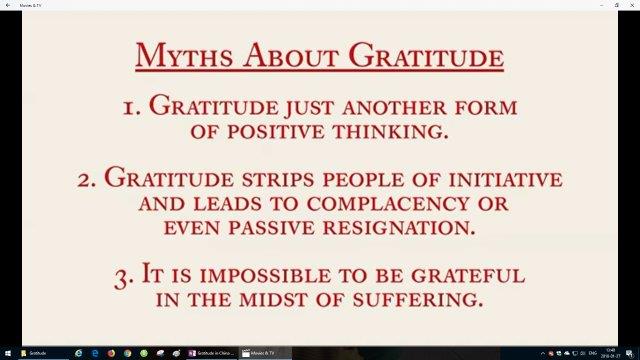
Robert Emmons is a Professor of Psychology at UC Davis California. His research is in the field of personality psychology, emotion psychology, and positive psychology.
[Robert Emmons Gratitude as the Lynchpin Between Adversity and Delight]
[Robert Emmons Gratitude Works! The Science and Practice of Saying Thanks]
[Robert Emmons Provost’s Lecture The Science of Gratitude]
[Robert Emmons Challenges to Gratitude]

[An Experiment in Gratitude _ The Science of Happiness]
A 7 minute video of a gratitude science experiment of a small sample of people and the results they got.
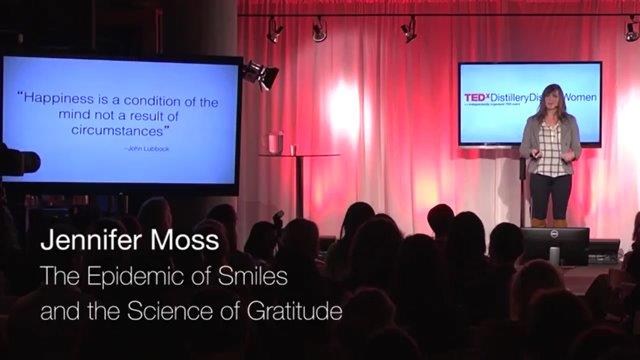
[The epidemic of smiles and the science of gratitude Jennifer Moss at TEDxDistilleryDistrictWomen]
Jennifer Moss shares her story on how smiles and gratitude got them through a major life threatening situation and led them into a worldwide social media and workplace application.

[Gratitude – Inspirational Video with Eckhart Tolle _ Tony Robbins]
5 minutes of some big names with some nice words on gratitude.
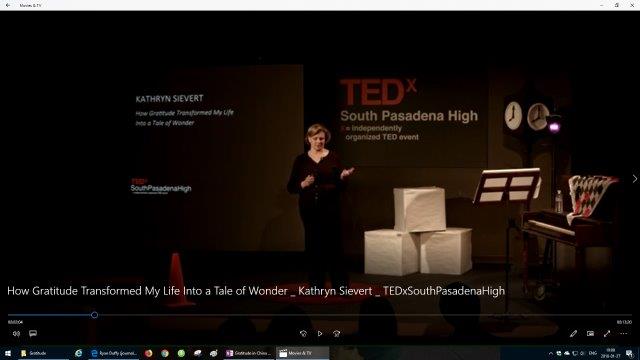
[How Gratitude Transformed My Life Into a Tale of Wonder _ Kathryn Sievert _ TEDxSouthPasadenaHigh]
At Sievert’s 50th birthday she set a goal to write 50 gratitude letters to people in her life. Sievert is a nice story teller and a nice example and some heart felt stimulation of being human.
Scientific Papers:
Emmons, R. A., & McCullough, M. E. (2003). Counting blessings versus burdens: An experimental investigation of gratitude and subjective well-being in daily life. Journal of Personality and Social Psychology, 84(2), 377-389.
http://dx.doi.org/10.1037/0022-3514.84.2.377.
Abstract
The effect of a grateful outlook on psychological and physical well-being was examined. In Studies 1 and 2, participants were randomly assigned to 1 of 3 experimental conditions (hassles, gratitude listing, and either neutral life events or social comparison); they then kept weekly (Study 1) or daily (Study 2) records of their moods, coping behaviors, health behaviors, physical symptoms, and overall life appraisals. In a 3rd study, persons with neuromuscular disease were randomly assigned to either the gratitude condition or to a control condition. The gratitude-outlook groups exhibited heightened well-being across several, though not all, of the outcome measures across the 3 studies, relative to the comparison groups. The effect on positive affect appeared to be the most robust finding. Results suggest that a conscious focus on blessings may have emotional and interpersonal benefits. From <http://psycnet.apa.org/record/2003-01140-012>
Gratitude and Prosocial Behavior: Helping When It Costs You
Abstract
The ability of the emotion gratitude to shape costly prosocial behavior was examined in three studies employing interpersonal emotion inductions and requests for assistance. Study 1 demonstrated that gratitude increases efforts to assist a benefactor even when such efforts are costly (i.e., hedonically negative), and that this increase differs from the effects of a general positive affective state. Additionally, mediational analyses revealed that gratitude, as opposed to simple awareness of reciprocity norms, drove helping behavior. Furthering the theory that gratitude mediates prosocial behavior, Study 2 replicated the findings of Study 1 and demonstrated gratitude’s ability to function as an incidental emotion by showing it can increase assistance provided to strangers. Study 3 revealed that this incidental effect dissipates if one is made aware of the true cause of the emotional state. Implications of these findings for the role of gratitude in building relationships are discussed. From <http://journals.sagepub.com/doi/pdf/10.1111/j.1467-9280.2006.01705.x>
Is gratitude a moral affect?
By McCullough, Michael E.,Kilpatrick, Shelley D.,Emmons, Robert A.,Larson, David B.
Psychological Bulletin, Vol 127(2), Mar 2001, 249-266
Abstract
Gratitude is conceptualized as a moral affect that is analogous to other moral emotions such as empathy and guilt. Gratitude has 3 functions that can be conceptualized as morally relevant: (a) a moral barometer function (i.e., it is a response to the perception that one has been the beneficiary of another person’s moral actions); (b) a moral motive function (i.e., it motivates the grateful person to behave prosocially toward the benefactor and other people); and (c) a moral reinforcer function (i.e., when expressed, it encourages benefactors to behave morally in the future). The personality and social factors that are associated with gratitude are also consistent with a conceptualization of gratitude as an affect that is relevant to people’s cognitions and behaviors in the moral domain. (PsycINFO Database Record (c) 2016 APA, all rights reserved). From <http://psycnet.apa.org/buy/2001-16969-004>
GRATITUDE AND HAPPINESS: DEVELOPMENT OF A MEASURE OF GRATITUDE, AND RELATIONSHIPS WITH SUBJECTIVE WELL-BEING
Authors: Watkins, Philip C.; Woodward, Kathrane; Stone, Tamara; Kolts, Russell L.
Source: Social Behavior and Personality: an international journal, Volume 31, Number 5, 2003, pp. 431-451(21)
Abstract
The purpose of these studies was to develop a valid measure of trait gratitude, and to evaluate the relationship of gratitude to subjective well-being (SWB). Four studies were conducted evaluating the reliability and validity of the Gratitude Resentment and Appreciation Test (GRAT), a measure of dispositional gratitude. This measure was shown to have good internal consistency and temporal stability. The GRAT was shown to relate positively to various measures of SWB. In two experiments, it was shown that grateful thinking improved mood, and results also supported the predictive validity of the GRAT. These studies support the theory that gratitude is an affective trait important to SWB. From <http://www.ingentaconnect.com/content/sbp/sbp/2003/00000031/00000005/art00001>
Beyond reciprocity: Gratitude and relationships in everyday life.
Abstract
The emotion of gratitude is thought to have social effects, but empirical studies of such effects have focused largely on the repaying of kind gestures. The current research focused on the relational antecedents of gratitude and its implications for relationship formation. The authors examined the role of naturally occurring gratitude in college sororities during a week of gift-giving from older members to new members. New members recorded reactions to benefits received during the week. At the end of the week and 1 month later, the new and old members rated their interactions and their relationships. Perceptions of benefactor responsiveness predicted gratitude for benefits, and gratitude during the week predicted future relationship outcomes. Gratitude may function to promote relationship formation and maintenance. (PsycINFO Database Record (c) 2016 APA, all rights reserved). From <http://psycnet.apa.org/record/2008-06717-013>


